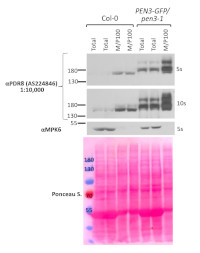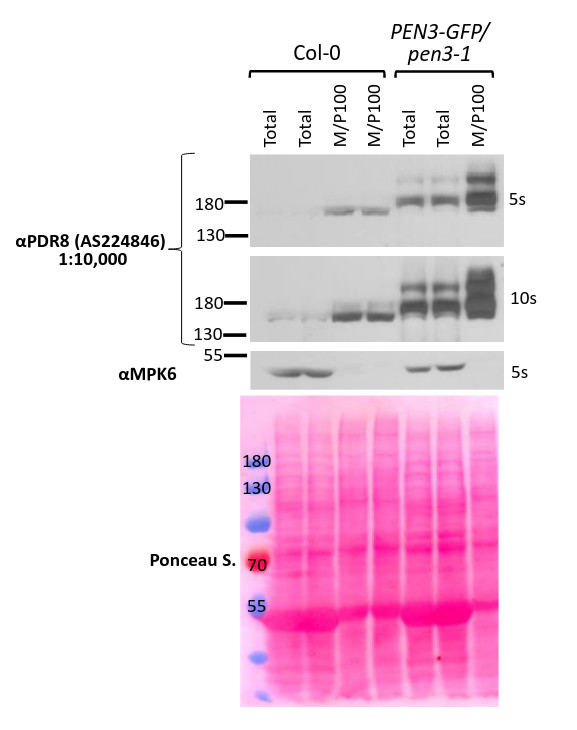1

Anti-PDR8 | ABC transporter G family member 36
AS22 4846 | Clonality: Polyclonal | Host: Rabbit | Reactivity: Arabidopsis thaliana
- Product Info
-
Immunogen: KLH-conjugated synthetic peptide derived from Arabidopsis thaliana PDR8, UniProt: Q9XIE2, TAIR: At1g59870 Host: Rabbit Clonality: Polyclonal Purity: Serum Format: Lyophilized Quantity: 50 µl Reconstitution: For reconstitution, add 50 µl of sterile water Storage: Store lyophilized/reconstituted at -20°C; once reconstituted make aliquots to avoid repeated freeze-thaw cycles. Please remember to spin the tubes briefly prior to opening them to avoid any losses that might occur from material adhering to the cap or sides of the tube. Tested applications: Western blot (WB) Recommended dilution: 1 : 10 000 (WB) Expected | apparent MW: 165 |150 kDa (Arabidopsis thaliana)
- Reactivity
-
Confirmed reactivity: Arabidopsis thaliana Predicted reactivity: Camelina sativa, Eutrema salsugineum
Species of your interest not listed? Contact us
Not reactive in: Triticum sp.
- Application Examples
-

Total protein (T) or microsomal protein fraction (M/P100) were extracted from 8-day-old Arabidopsis thaliana seedlings according to (1). Seedling genotypes include Col-0 (wild-type) and PEN3-GFP/pen3-1, withpen3-1 being a knock-down mutant (2). Note that PEN3is also referred to as PDR8 or ABCG36; and the expected apparent MW of PDR8/PEN3/ABCG36 is 165 kD and that of PDR8/PEN3-GFP is 192 kD. 37 μg of proteins were denatured at 65°C for 5 minutes, separated on an 8% SDS-PAGE and transferred to nitrocellulose membrane (0.45 μm) via tank transfer system at 50V for 70 minutes. The blots were blocked using PBS+0.1% Tween 20 (PBS-T)+5 % milk at room temperature (RT) while agitated for one hour. Blots were incubated in primary αPDR8 antibody (Agrisera, AS22 4846) diluted to 1:10,000 in PBS-T+5 % milk at 4°C overnight. Primary antibody solution was removed, and blots were washed five times with PBS-T for each 5 minutes at RT while agitated. Blots were then incubated with secondary goat anti-rabbit IgG H&L (Agrisera, AS09602) diluted to 1:25,000 for one hour and washed four times with PBS-T for 5 minutes each while agitated. Blots were developed using a mixture of chemiluminescent reagents for indicated exposure time in seconds. Total protein stain Ponceau S and antibodies against cytoplasmic MPK6 were used as loading controls.
In this experiment PDR8 protein detection was validated using Col-0 (wild-type) and PEN3-GFP/pen3-1, with pen3-1 being a knock-down mutant. Note that PEN3 is also referred to as PDR8 or ABCG36; and the expected apparent MW of PDR8/PEN3/ABCG36 is 165 kD and that of PEN3-GFP is 192 kD.
Courtesy of Eric Fritschi, Nga Nguyen, and Antje Heese at University of Missouri-Columbia, Div of Biochemistry, the Interdisciplinary Plant Group (IPG), Columbia, MO (USA).
Reference:
1. LaMontagne ED, Collins CA, Peck SC, Heese A. Isolation of Microsomal Membrane Proteins from Arabidopsis thaliana. CurrProtocPlant Biol. 2016 May;1(1):217-234. doi: 10.1002/cppb.20020. PMID: 31725992.
2. Lu et al. (2015) Mutant Allele-Specific Uncoupling of PENETRATION3 Functions Reveals Engagement of the ATP-Binding Cassette Transporter in Distinct Tryptophan Metabolic Pathways. Plant Physiol. 168 (3): 814–827. - Additional Information
-
Additional information (application): Protein or membrane sample should be treated in temperatures not higher than 65°C -70°C for 10 min before loading to the gel.
- Background
-
Background: PDR8 protein is a key factor which controls the extent of cell death in defense response. Alternative names: ABC transporter ABCG.36, AtABCG36, pleiotropic drug resistance protein 8, protein PENETRATION 3 - Protocols
-
Agrisera Western Blot protocol and video tutorials
Protocols to work with plant and algal protein extracts
Agrisera Educational Posters CollectionMethod for isolation of plant plasma membranes
.jpg)
Courtesy of Dr. Masayoshi Maeshima, Laboratory of Cell Dynamics, Graduate School of Bioagricultural Sciences Nagoya University Nagoya, Japan
- Reviews:
-
This product doesn't have any reviews.
Accessories

AS07 213 | Clonality: Polyclonal | Host: Rabbit | Reactivity: Higher plants including A.comosus, A.thaliana, C.sativus, C. australis R.Br, C.reinhardtii, F. margarita Swingle, H.vulgare, L.esculentum, L.longiflorum, Malus x domestica Borkh. c.v. Fuji, M. truncatula, M.crystallinum, N.tabacum, N.caerulescens, O.sativa, P.hybrida cv. Mitchell, Populus sp., P.vittata, Thellungiella sp., T. aestivum, Z.mays, V. vinifera | Cellular [compartment marker] of tonoplast membrane

AS07 260 | Clonality: Polyclonal | Host: Rabbit | Reactivity: [global antibody] for di- and monocots, conifers, ferns, mosses, green algae | Cellular [compartment marker] for plasma membrane
Benefits of using this antibody

